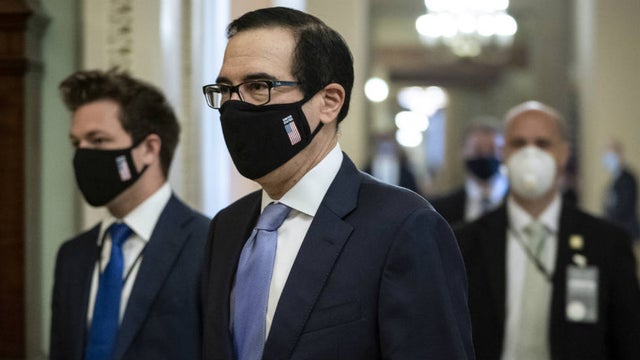
Treasury Secretary Steven Mnuchin on Wednesday offered a preview of the Trump administration’s priorities for the next coronavirus emergency relief bill, including willingness to consider a new round of emergency loans for small businesses.
Speaking at a Senate Small Business Committee hearing, Mnuchin discussed the prospects for more Paycheck Protection Program (PPP) loans for small businesses and revamping recent changes to unemployment insurance.
The secretary’s appearance comes as congressional Republicans pump the brakes on another COVID-19 relief package. GOP lawmakers have raised concerns about rising deficits and argued that Congress should wait and see the effects of almost $3 trillion in previous aid.
“I think this is all going to be about getting people back to work,” Mnuchin said, referring to further legislation.
Mnuchin said that if there is a new round of PPP loans they would need to be far more targeted, given how the economy has shown signs of improvement compared with earlier in the pandemic.
“Whatever we do going forward needs to be much more targeted to the industries and small businesses having the most trouble going forward,” he said.
The PPP, which offered forgivable loans to small businesses to weather the pandemic, is credited with helping save tens of millions of jobs. But it has also been a source of controversy, as several major corporations tapped the federal loans before small firms were able to secure funding.
Mnuchin said Wednesday that roughly $12 billion was returned by big companies that had reconsidered their need for the loans, a turnaround that followed a public outcry and the Trump administration threatening criminal liability. Congress has approved almost $660 billion for the loans since the pandemic started.
A trio of Democrats — ranking member Sen. Ben Cardin (Md.), Jeanne Shaheen(N.H.), and Chris Coons (Del.) — said Wednesday they were offering a bill to allow for another round of applications for businesses that needed another bridge loan tailored to “genuinely” small businesses that suffered “significant” revenue loss.
Sen. John Kennedy (R-La.) said he was offering a separate measure that would direct some of the funds toward helping businesses damaged or destroyed in recent civil unrest over racial injustice.
For workers who are still unemployed, Mnuchin told senators he would seek to change the approach to unemployment insurance, a key sticking point between Democrats and Republicans on Capitol Hill. Republicans note that the additional $600 in weekly insurance, approved by Congress earlier in the pandemic, means many recipients face the prospect of reduced income if they return to work.
Mnuchin appeared to endorse another proposal that some congressional Republicans have floated to resolve the issue by providing a back-to-work incentive.
“We’re going to need money for business to encourage businesses to rehire in areas that have been most impacted,” he said, citing restaurants, hospitality and travel industries.
One aspect of another relief bill that Mnuchin signaled opposition to was the idea of including reductions in capital gains taxes, something the White House has floated in the past.
Incentivizing investment as the recovery gets underway, Mnuchin told lawmakers, doesn’t seem necessary in light of the extraordinary measures taken by the Federal Reserve to bolster the financial system and markets.
The Senate’s urgency to pass another coronavirus relief bill has somewhat lifted following an unexpectedly positive jobs report in May.
While the upper chamber had been expected to work on its version of the bill before the July 4 recess, Senate Majority Leader Mitch McConnell (R-Ky.) pushed the timetable back to late July.
Democrats, meanwhile, are calling for urgent action. The House passed its own version of a new relief bill, which carries a $3 trillion price tag. Senate Republicans have said they will not take up that measure.
Updated at 1:58 p.m.


